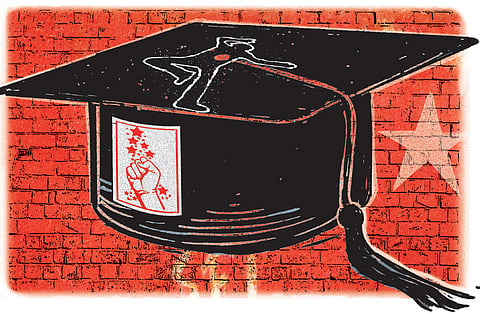

Recently, in the sleepy district of Wayanad, a 19-year-old boy was lynched to death in his college hostel. Sidharathan JS, a second-year student in the College of Veterinary and Animal Sciences in Wayanad, is the latest victim of brutal campus politics in Kerala. What stood out in this newest addition to the gory list of victims is that Sidharathan wasn’t killed in a clash between the goon gangs that masquerade as student unions of various political parties but was lynched after a mob trial that would have made the Taliban or ISIS ashamed.
Sidharathan was savagely beaten, marched naked across the campus in front of approximately 130 students, and allegedly battered with belts and iron rods. Accounts indicate that a glue gun was also employed to inflict pain. He was reportedly starved and denied even water for three days. The hapless parents had spoken to the student a few hours before his death, and at that time, they were not aware that their son was undergoing a Taliban-style trial on his campus, led by his classmates and even some whom he considered friends.
The college authorities tried to hush up the issue for the initial few days. The reason for such a callous act is not difficult to guess. The majority of the accused belong to the members of the Student Federation of India (SFI), the ruling party’s student organisation. Many students have come out now and said they were scared to report the issue as the political party rules the campus. The Kangaroo court had decided to punish Sidharathan for allegedly misbehaving with a female student.
A complaint was filed against Sidharathan a day after he had died. The trial by the mob court had already executed Sidharathan by then. When the news finally broke, there was an uneasy silence among the self-proclaimed intellectual community of Kerala, who are usually vociferous against similar mob lynching in other parts of the country or the Palestine issue. The media pressure built up, and now FIRs have been filed. The government has condemned the incident and promised strict action against the culprits, and some of the intellectuals have crawled out of their caves to proclaim half-hearted condemnation of the incident.
The events surrounding Sidharathan’s tragic death reignited the long-standing debate: Should student politics be banned in India? Violence on Kerala’s campuses is nothing new. It is unfair to single out Kerala or the SFI alone, as every political party has its student wing that indulges in such activities across campuses in India. JNU and Delhi University have been witnessing continuous clashes between the student bodies of the respective political parties, SFI, ABBVP and NSU.
It is high time to abolish student politics, which breeds violence and hooliganism on campuses. The core purpose of educational institutions is overshadowed by the constant power struggles between various student wings. Instead of fostering an environment of learning and intellectual growth, colleges have become breeding grounds for intolerance and brutality. No wonder we barely have any institutions of international repute.
Student associations function as recruitment hubs, indoctrinating young minds into their ideological beliefs early on. Students are coerced into advancing the agendas of these organisations through demonstrations, walkouts, confrontations and violence. It breeds tribalism. The silent majority of pupils who wish to remain apolitical find themselves powerless against the forceful tactics employed by these unions. Student politics often creates an environment of intolerance and discourages critical thinking. Students are expected to align themselves with a particular ideology, and dissent is usually met with hostility.
This stifles intellectual growth and prevents students from developing their independent views. Anyone opposing the decrees of political parties faces harassment, intimidation, and even physical violence, as Sidharathan’s case exemplifies. When young people are taught that violence and intimidation are acceptable means of resolving conflicts, it seeps into their adult lives. The hooliganism on display on college campuses today is a microcosm of the more significant issues plaguing Indian society, where muscle power and political connections often take precedence over merit and reason.
One argument for allowing student politics on campus is the claim that it furnishes pupils with an avenue to articulate their apprehensions and engage in the democratic system. Nonetheless, alternative methods exist for learners to express their worries and partake in the democratic process without resorting to brutality and ruffian conduct. Student councils and other non-political organisations can provide students with a platform to voice their concerns and to participate in the decision-making process of their educational institutions. These organisations can also help to promote a culture of dialogue and understanding, rather than one of violence and intimidation.
Banning student politics would create a more conducive environment for learning and intellectual growth. Students would be free from the pressures of political affiliations. It’s no wonder most prefer foreign universities, even mediocre ones, over our prestigious institutions. Which parent desires to be in Sidharathan’s position? How many dreams will be shattered by this toxic culture of politics on the campus that serves only as the goon-training centre of political parties before we wake up?
Anand Neelakantan
Author of Asura, Ajaya series, Vanara and Bahubali trilogy
mail@asura.co.in